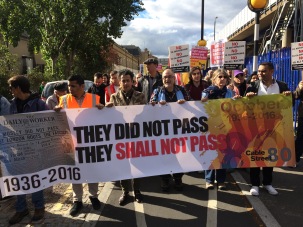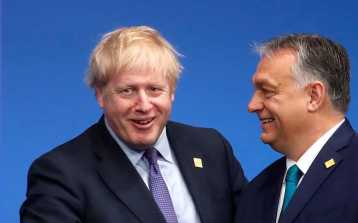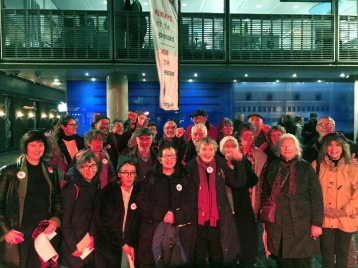Dear Keir,
Congratulations on winning the Labour leadership contest. I will confess that I did not vote for you, and also that, because the campaigning period for the contest had been significantly truncated by the Coronavirus emergency in which lives were and are being lost at the most alarming rate because of Government failures, I also proposed through social media that the contest should have been suspended, to be resumed later in the year.
Given that Jeremy Corbyn, as Labour Leader, was playing the central role in holding the government to account on these failures and putting forward alternative proposals for action, I suggested that Labour should have established an interim Emergency Shadow Cabinet Leadership consisting of Jeremy Corbyn and the three leadership candidates, which would last until the pandemic was receding and life was returning to normal, before formally resuming the campaigning period for the Leadership.
That didn’t happen, and we are where we are. You are now in that central position. But as an active, ordinary, Jewish Labour Party member, an elected officer in my CLP, and a trade union branch officer in the NEU, I wanted to address you directly, Keir, in relation to a concrete initiative that you took yesterday – your letter to Marie Van der Zyl, President of the Board of Deputies. I want to ask you several questions.
My status as “an active, ordinary, Jewish Labour Party member” ought to be a sufficient reason for me to wish to communicate with you on this, but perhaps I need to say a bit more.

Singing a Yiddish song of resistance at a memorial in Auschwitz/Birkenau, 2019
I have been involved in anti-racism, as well as education and campaigning about antisemitism both professionally and at a more grassroots level for several decades. In the 1980s I worked for the GLC-funded Jewish Cultural and Anti-Racist Project. After Margaret Thatcher closed down the GLC, I worked for several years at the Runnymede Trust. During each of the last four years I have helped lead an educational initiative that takes multicultural, cross-generational groups of trade unionists and anti-racist activists to Krakow and Auschwitz where we learn about antisemitism, past and present, and make links with other bigotries that are reemerging so menacingly especially in Europe and America today.
In 2011, I published a book about the Jewish confrontation with fascism and antisemitism in 1930s Britain (Battle for the East End). I teach adult education courses that include aspects of London’s Jewish history and another focusing on Jewish life and death in Warsaw with a central focus on the Warsaw Ghetto and the Uprising of 1943. In 2016 I was the overall convenor of Cable Street 80 – the celebration of an immensely proud moment in the history of London, the Jewish community and the labour movement, when people united across communities in huge numbers to prevent thousands of Mosley’s uniformed and jackbooted fascists from terrorising people in predominantly Jewish streets in the East End.
At the two rallies – before and following a commemorative march – Labour was

Marching along Cable Street 2016
represented by three MPs: Rushanara Ali, Dawn Butler, and Jeremy Corbyn who made a very moving concluding speech. The other (now retired) Tower Hamlets MP, Jim Fitzpatrick, was out of London that weekend but was very helpful and supportive of the event. Other speakers included the Labour Mayor of Tower Hamlets, John Biggs, several trade union speakers, including TUC General Secretary, Frances O’Grady, and representatives of Bangladeshi, Irish and Jewish bodies (including the Jewish Labour Movement and the Jewish Socialists’ Group, and Cable Street veteran Max Levitas). You may have been there too among the 3,000-strong crowd. Our only regret was that London’s Labour Mayor, Sadiq Khan, was the sole politician not to reply to several invitations to speak.
So, to my questions. You say in your letter that you “will be speaking with the Jewish community” but could I ask you to clarify who you mean by the Jewish community? In addition to Marie Van der Zyl’s organisation (the Board of Deputies), you have listed three organisations, the Jewish leadership Council (JLC), the Community Security Trust, and the Jewish Labour Movement (JLM). The first two of these are entirely unelected, while the Board of Deputies has a severe democratic deficit. The Board has a monthly “parliament” meeting of representatives, mostly elected through synagogues in uncontested elections. At least until recently, some of these synagogues were denying women members a vote for their representatives.
This “parliament” debates issues, but the key decisions of the Board are made by paid officers. The significant and growing Haredi (ultra-orthodox) communities don’t recognise the authority of the Board of Deputies (BoD). How are the estimated 50% of secular Jews represented by the Board? The majority of Jewish Labour Party members are secular Jews.
The BoD record in opposing antisemitism is a very chequered one, to put it charitably. They told Jews to stay indoors on the day of the Battle of Cable Street; they denounced the courageous 43 Group who took on fascists immediately after World War 2; they discouraged Jews from joining the Anti-Nazi League, the largest mass anti-fascist and anti-racist movement in the 1970s, at a time when the National Front was menacing communities. All this was because of sectarian political differences. Thankfully at all these junctures, many ordinary Jewish people ignored the BoD’s injunctions. You probably know that Marie Van der Zyl’s Tory predecessor as President of the BoD, Jonathan Arkush, was one of the first to heap lavish praise “on behalf of Britain’s Jews”, on Donald Trump, when he was elected US President, despite the fact that 70% of American Jews voted against Trump and an extreme scarcity of British Jews who support him!
In recent years I have visited Poland several times (Warsaw and Krakow). I am all too aware of the unsavoury regimes in central and Eastern Europe, where antisemitism rides in tandem with Islamophobia and anti-Roma prejudice, and also aware of the

Best mates: Johnson and Orban
Conservative Party’s close alliance with their leaders through the Conservatives and Reformists Group in the European Parliament before Brexit. Outside of that group too, Tory leaders have been full of praise and support for Hungary ‘s Premier, Victor Orban. Does it not worry you, Keir, that in the last 10 years, the BoD, JLC, and CST, who claim to challenge antisemitism in a non-party political manner, have been so muted in expressing any criticism of these regimes and of the Tory’s close associations with them?
I also wonder this, Keir: where in your letter can I find an indication that you intend to engage with grassroots Jewish Labour Party members? I suspect you will answer by pointing to your plan to meet with JLM, and certainly they represent a section of the Party’s Jewish members. Long ago, in their previous incarnation as Poale Zion, they had a history of Labour Party activism, trade union work and anti-fascist engagement, but I am sure you are aware that they are far from representative of all Jewish Labour Party members. You do not have to be Jewish or a Labour Party member to be a member of JLM but you do have to sign up to an explicitly Zionist constitution.
This immediately excludes a large proportion of Jewish Labour Party members who, if asked to define themselves in relation to Zionism, would reply that they are non-Zionist or anti-Zionist. And they would do so either on the grounds that their most relevant terrain of political engagement is here, in Britain, not in Israel. They happily consider themselves Diasporic Jews. Or they might express varying degrees of disapproval or outrage about the injustices and human rights abuses committed by the Israeli government, military, and settlers against Palestinians, which has been exacerbated by Israel’s Nation-State Law of 2018, a law condemned by many Israeli commentators as an “apartheid law”. I know many Jewish people, young and old, who have joined the Labour Party since 2015, enthused by it becoming a more radical party fighting for social justice and with an explicitly ethical approach to international issues, including Israel/Palestine. What plans do you have to engage with these members, Keir?
I am a grassroots member of a Jewish Labour organisation called Jewish Voice for Labour (JVL) which was launched at a meeting attended by 300 people at the Labour Party’s Conference Fringe in 2017. JVL does not stipulate taking a particular position on Zionism as a condition of membership. Its Statement of Principles says: “We aim to strengthen the party in its opposition to all forms of racism including antisemitism, broadening the party’s appeal to all sections of British society”, and “We stand for rights and justice for Jewish people everywhere, and against wrongs and injustice to Palestinians and other oppressed people anywhere.” On many anti-racist and anti-fascist protests I have marched and participated alongside JVL members but seen no presence at all from the Jewish bodies you have declared you wish to meet with.

JVL go canvassing in Westminster for the left wing Jewish Labour candidate, Gordon Nardell
During the General Election in 2019, I was active campaigning in several marginal constituencies, often in the company of other Jewish Labour Party members. I was quite shocked to find that JLM had declared that they were boycotting the General Election and would only be working for a Labour victory in a handful of constituencies. The contrast with JVL, which encouraged its members to canvass wherever they were, for every Labour candidate, whether supporters of the leadership or not, as well as doing specific work in certain marginals, was very stark. JVL now has over 1,000 members in constituencies across the country. Unlike JLM, full voting members have to be Labour Party members and define themselves as Jewish. So, Keir, can you confirm that you intend to meet with JVL too, and that you would also like to meet with non-Zionist and anti-Zionist Jews who are Labour Party members?
Some final questions. I was a member of the Labour Party for a few years in the 1980s (in Newham, then in Camden) but was disillusioned by the party’s rightward drift and dropped out, though I remained personally close to many Labour activists and worked with them in a range of progressive campaigns. I rejoined (in Islington) in 2015, as Labour shifted towards becoming more explicitly a member-led party. It grew enormously in size and potential. It is a party where, unlike the Tories, democracy counts. Our members make policy. But that is why I found it disturbing that all the leadership candidates and a majority, though not all, of the deputy leadership candidates, were so quick to sign up to a series of pledges from an external third party that many considered anti-Labour. What if these pledges conflict with member-led policy decided at Conference? And what about the excellent proposals that many members were involved in developing that were presented at the Race and Faith Manifesto launch in November 2019. Will you seek to honour that manifesto? And how would you justify handing over party disciplinary matters to a body unrelated, unaccountable and often hostile to the Labour Party?
In your letter to the Board of Deputies you said you wished to reiterate your “commitment to stamping out antisemitism within the party”: a commitment I am entirely at one with, along with stamping out other bigotries and forms of discrimination. How that is done has proven to be complex and problematic. While I have certainly encountered antisemitism in wider society, for example on public transport, at football grounds, in online commentary, I have not encountered it in the Labour Party, but I know members who have.
There are of course real incidents that must be dealt with, though we know from Jennie Formby’s statistical analysis that it is a very small number, and people don’t generally join Labour to indulge in bigotry (the Tories maybe!) We also know that many allegations of antisemitism relate to commentary on the Israel/Palestine question, where those accused may not have realised they have crossed a line from strong but fair comment to bigotry. Shami Chakrabarti did some excellent work on this, proposing that education should be the first resort and heavy-handed discipline the last resort. Do you agree with her about this, Keir?
I hope you will address these questions, because these are of considerable importance to many Jewish members who feel that the Labour Party speaks to their concerns to a much greater extent than the Board of Deputies ever will.
Sincerely
David Rosenberg
Keep asking the questions, David. We all must. Keep the beacon proudly burning.
LikeLike
A brilliant letter David – I really hope you receive a reply from Keir Starmer.
LikeLike
Nicely framed. Thank you.
LikeLike
Excellent analysis of the situation.
LikeLike
You have really grabbed the bull by the horns, David. A spur to sustained action.
LikeLike
Fantastic. All the Qs I would want answered and put in a way that I could not, calm, reserved and measured. Welldone.
LikeLike
You have put Keir in the dock! Brilliant.
LikeLike
Excellently put – thank you for clarifying so many things that I hadn’t understood.
LikeLike